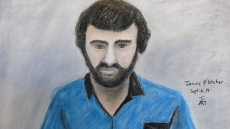A Vermont tattoo artist who has long offered free removal or covering of hateful skin art like swastikas, SS lightning bolts or the words “white power” says he’s seen an uptick in business recently following George Floyd's death.
Alexander Lawrence, who runs Mountainside Tattoo from a storefront in the village of Bellows Falls, Vermont, says he’s always offered to remove hateful images or cover scars for free. But following Floyd's death at the hands of Minneapolis police, which sparked global protests against police brutality and revived the Black Lives Matter movement, Lawrence says he's been getting so many requests he's looking for an office manager to schedule his appointments.
"I think they were out there, but it wasn't, like, in the limelight, you know, until things started happening and people are, like, ‘Oh, man I have this old tattoo. I'm not like that anymore and I don't want people to think that I am,'" Lawrence said.
Earlier this month Dylan Graves, 28, visited Lawrence's shop to cover a swastika tattoo superimposed over a grinning skull wearing a World War II German army helmet he had inked on the inside of his upper left arm a decade ago.
When asked why he got the tattoo, Graves answered, “Stupidity, partying when I was younger. Really, that's it. Just being dumb."
Now he works for an excavation company that does jobs at the homes of wealthy people in the tourist town of Ludlow.
"It's just not something to have on, and I hate it now," he said while Alexander sketched the outline of the image that would cover the swastika.
Many tattoo artists across the country will cover or erase old tattoos, especially in the aftermath of Floyd's killing, but Alexander said not all do it for free.
Dr. Jeffrey Dover, a dermatologist who is the director of SkinCare Physicians in Chestnut Hill, Massachusetts, said cover or removing offensive tattoos is a public service.
“It’s a pro bono service to the community, a service to humanity, a service to the individual who has the tattoo, but also to all those who are offended by the tattoo,” said Dover, who is also an associate professor of Dermatology at Yale School of Medicine. “Just think of the recoil of a Holocaust survivor who sees a Nazi tattoo."
Alexander said he's been doing free coverups since shortly after he opened his business in 2006. He's had brushes with the law and the free coverups are a way give back.
“I’ve had people forgive me and look past my bad decisions and help me get to a better place," he said.
It's hard for people with offensive tattoos to escape them, and he said helping to remove them is a way he can help.
"These people, they're stuck looking at their bad decisions every day," he said. “They have to hide them.”
Alexander said he covers lots of symbols associated with Nazi Germany. Within the next few weeks, Alexander expects to see a customer who has “white” tattooed on the back of the calf of one leg and “power” tattooed on the other.
Alexander said many want to cover the tattoos because businesses don't want to have employees seen as racist.
“I see it all the time, people losing their jobs because of bad decisions from previous years,” he said.
As an artist, Alexander said he was contemptuous of hate tattoos, most of which aren't professionally done.
“They're homemade," he said. "They're usually big and disproportionate and not even clean lines. So not only are they racist, but they're crappy.”
Graves said his swastika tattoo hasn’t drawn a lot of attention because it’s hidden, but he was still eager to get rid of it.
Since Graves' tattoo already has the image of a skull, Alexander used a pen to outline the image of the grim reaper. After he outlines the swastika coverup Alexander starts applying the ink while Graves occasionally grimaces.
After almost 90 minutes in Alexander's tattoo chair, the swastika is gone, replaced by the head of a grim reaper, the mythological character that is a symbol of death.
“What do you think, man?” Alexander asks Graves as he gives the arm a final wipe-down.
“Yeah, man,” Graves answers.
After getting out of the chair and looking at it in the mirror, Graves said, “It's awesome."






